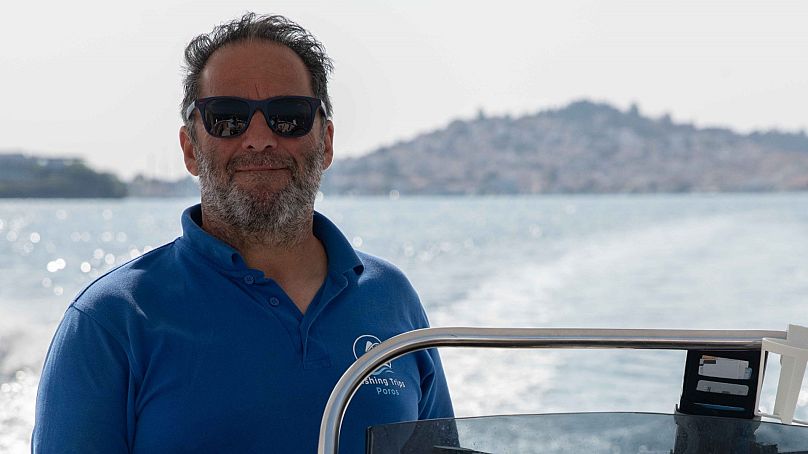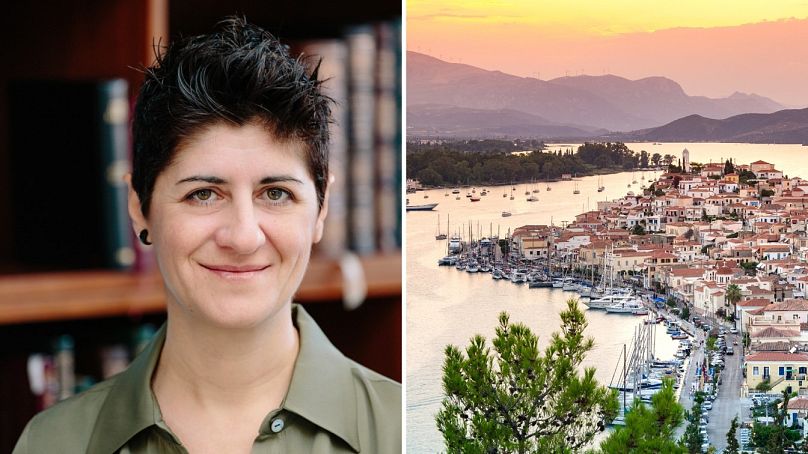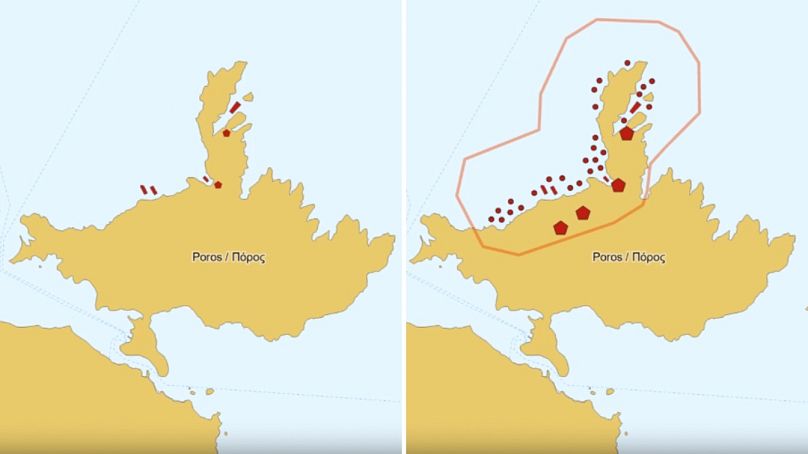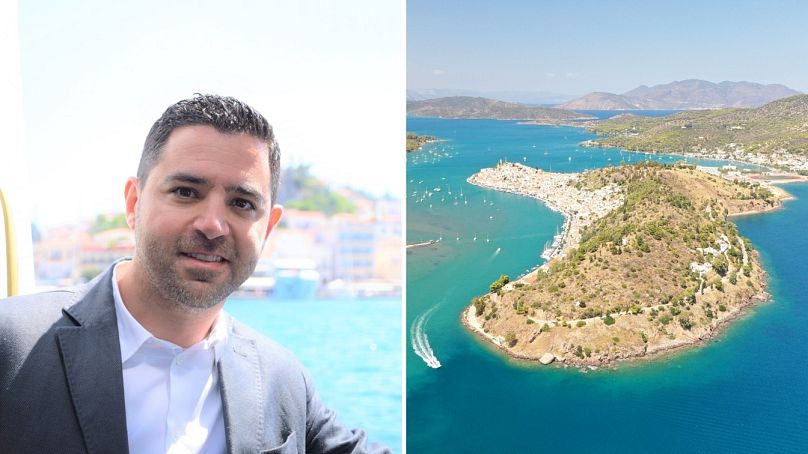‘We cannot watch this go ahead without a fight’: Greek islanders are rallying against plans for a giant fish farm.
Greek islanders are rallying against an industrial fish farm that would dominate a quarter of their land and coastline.
 ADVERTISEMENT
ADVERTISEMENT
 ADVERTISEMENT
ADVERTISEMENT
The island of Poros, just an hour’s ferry ride from Athens, is popular with eco-tourists who come to explore its pine forests and pristine coastline.
Eighty per cent of the island’s 3,000 residents rely on tourism - either directly or indirectly - for their income.
If approved, the fish farm would expand the island’s fish production by more than eight times, inundating its delicate underwater ecosystems with waste food and faeces.
As well as deterring visitors, this could impact the island’s wild fish, endangered European monk seals and Posidonia (seagrass) meadows.
Why are locals opposed to the fish farm on Poros?
The multimillion-euro plan seeks to expand the size of the island’s four existing fish farms by 28 times. Within five years, it aims to expand annual fish production from just almost 1,000 metric tonnes to over 8,000.
This would have a devastating impact on Poros’s fragile ecosystems - and the local economy.
“When the marine environment is degraded… tourists will inevitably stop coming to enjoy the clean water and pine forests,” says Andreas Kaikas, a member of the local tourist committee.
Already, fish farms are squeezing the area’s tourist industry.
“[The farms] occupy… our bays and other spots in this stunning area,” says Tasos Ladas of Poros’s Professional Fishermen Association, who takes tourists to visit the island in the summer. “We then cannot use [these] for boats, for swimming, or just for the enjoyment and recreation of tourists.”
The new farm paints a bleak outlook for the island’s beauty spots.
The predicted 15 metric tonnes of waste that it, along with the island’s four existing farms, would generate daily is “equivalent to the waste from a town larger than 36,000 people - over ten times that of Poros,” notes Fay Orfanidou, who runs Katheti, the island’s non-profit cultural centre.
“They should do it elsewhere,” says Ioannis Dimitriadis, Mayor of Poros, “in an area where there is not a community of 3,000 residents all opposed to fish farming and where almost all are making a living from activities that will inevitably be compromised.”
Will the fish farm create jobs in Poros?
The plan for Poros would take much and offer little to the island.
In 2020, Greece’s 989 fish farms employed a total of 3,900 people either permanently or seasonally - an average of 3.9 people per farm, based on figures released by the industry.
“I remember we were told that fish farms would provide a lot of work and create economic benefits for everyone,” says Katerina Sakelliou, who owns eco-glampsite Odyssey Farm on Poros.
“Time has shown that the current farms employ very few local people, and have brought only contamination and damage to the environment.”
To date about 15 people work on Poros’s four existing fish farms.
Who’s behind the proposed fish farm on Poros?
Valencia-based Avramar, Europe’s leading producer of farmed fish, owns 70 per cent of Greece’s production. The company is behind the Poros plan.
Once Greek-owned, Avramar was taken over by two private equity funds in 2016. These companies are looking to get their investment returns fast, before costs, such as fish feed, rise any further.
“They are looking at profiting when they exit, so they want to make sure they produce as much [fish] as possible,” says Devlin Kuyek, author of a report by Spanish NGO Grain about the growing investments by private equity funds in the aquaculture industry in Spain and Greece.
According to Devlin, these investors are likely aiming to increase the production capacity in order to sell their assets within a few years.
“What that means for the environment or the impact on employment in other local industries, that’s not something they care about.”
Why would the Greek government approve the fish farm?
The EU considers aquaculture a strategy for more sustainable food systems. It will grant Greece €364 million from the European Maritime, Fisheries and Aquaculture Fund 2023-2027, of which 25 per cent will go to aquaculture.
These funds, according to Virginijus Sinkevičius, EU Commissioner for Environment Oceans and Fisheries, will “support Greece’s green and digital transition”.
The Poros farm is part of the Greek government’s wider plan to expand aquaculture in the country. It is one of 25 sites selected for the scheme, which was first put forward in 2011. So far, eight of these have been definitively approved.
The absence of large production or major hotels on Poros made it a prime candidate for the scheme.
“No one wants to go there and build Hilton hotels or major resorts in order to subsidise the local economy,” says Filippos Petridis, director at Ambio, the consulting company that produced the environmental impact study for the project.
“I believe it's wrong to say that we need fish farming for the development of the region, as it is already developed around tourism,” says Katerina.
In 2015 Poros had a 4,000-bed capacity and 54,000 overnight stays.
‘A net loss to our community’
It is unknown when a final decision will be made about Poros, but the go-ahead was given earlier this year for the area of Xiromero, which also strongly opposed the fish farms.
Poros residents and local government alike are resisting the plans for the fish farm.
In October 2020, the Poros Municipal Council voted unanimously against the establishment of industrial-scale fish farms.
“The State comes with legal procedures, overriding the will of the people and the powers of the elected bodies, forcing something that is completely against the wishes of the local community,” says Mayor Dimitriadis.
The local government will be excluded from supervising the expansion of the farm.
This plan “will establish and give an administrator role over a large part of the territory to a private company. If we don't call this a colonial model, I don't know what we would call it,” he continues.
“We cannot watch this plan go ahead without a fight,” says Fay, whose family has lived on Poros for over 200 years.
“The same unjust scenario is playing out all around the world. We stand in support of others who share our mission, and urge people of all ages, everywhere, to help us save Poros. What we’ve been promised is a net loss to our community.”
Are fish farms sustainable?
Fish farming is often touted as a sustainable path to food security. It is seen by the EU as a source of ‘low carbon’ protein for food and feed. Some also say it can help combat overfishing and destructive fishing of wild species.
However, it often makes the situation worse, according to Greenpeace.
The practice has been shown to have negative impacts on marine life - particularly in delicate ecosystems like the one on Poros.
Environments surrounding fish farms become polluted by fish waste, uneaten food and the chemicals and antibiotics used to control disease.
Producing 1,000 metric tonnes of fish requires 2,000 metric tonnes of feed - some of which consists of wild-caught fish stocks. Between 10 and 20 per cent of this feed is lost to the environment.
This combined with faeces and dead fish results in huge quantities of harmful, nitrogen-rich waste, which starves marine life of oxygen, resulting in ‘dead zones’ surrounding the fish farms.
Diseases and parasites also often arise in fish farms, especially in overcrowded cages. These can spread from captive fish to their wild counterparts. Questionable levels of antibiotics and chemicals like formaldehyde are widely used to curb these ailments.
In Greece, the seabed faces additional strain due to the proximity of fish farms to the shoreline. Unlike in Spain and Italy, where farms tend to be built miles from the coast in the open sea, most Greek farms are located just 50 to 200 metres from the coast.
This is desirable to the farm owners as it lowers transportation and other costs, and reduces risks associated with currents and storms. However, it also reduces important water recirculation, and is detrimental to the seabed.














